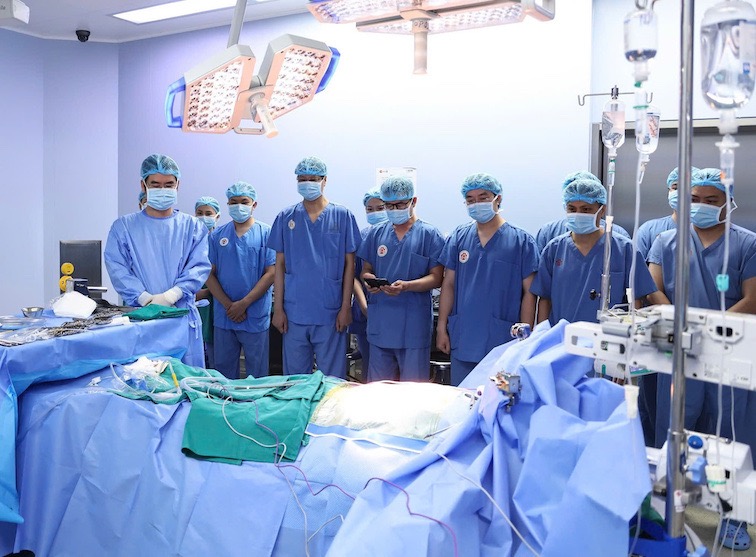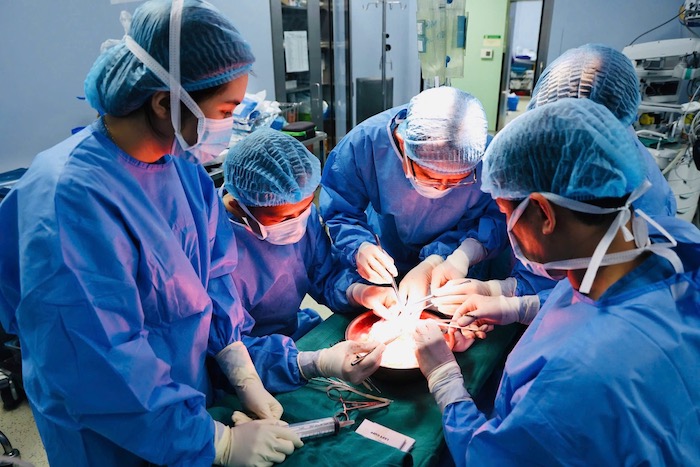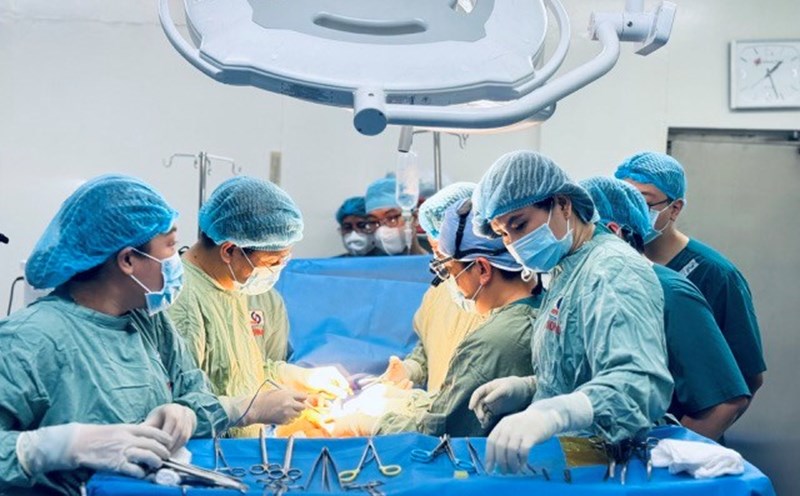4:00 p.m. on April 29, the Hospital's Organ Transplant Center received information about a brain-dead person donating potential organs from the Stroke Department. The Organ Donation Exercise Department immediately discussed the situation with the treating doctor to grasp information and advise, and mobilize the patient's family.
The organ donor was a male patient born in 1968 diagnosed with brain death due to a stroke, cerebral infarction, and severe cerebral edema. Suppressing the pain, the patient's family voluntarily agreed to donate organs according to the patient's wishes while he was still alive.
Before my husband had a health problem, my husband and I told each other that we would agree to donate organs when he died to save more lives. Now, his family has fulfilled his wish while he is still alive. I just hope that other people who are saved can live well, just like my husband is living" - the wife of the organ donor emotionally shared.
At 3:00 a.m. on April 30, the patient's condition became worse. At 7:00 p.m. the same day, the patient was diagnosed with brain death for the third time.

Units throughout the hospital have coordinated with the Organ Transplant Center and subcommittees to work through the night regardless of time and day off to screen, check, and evaluate the recipient before surgery to optimize treatment effectiveness and ensure patient safety.
At 8:00 a.m. on May 1, 108 Central General Hospital organized a consultation to collect and transplant multiple organs including: 1 liver transplant; 2 kidney transplants; corneas are collected and preserved for future transplantation.
The units have urgently prepared and supplemented enough human resources and materials to conduct the surgery at 10:30 a.m. on May 1.
The liver recipient is a male patient, born in 1979, with hepatitis B detected and not treated for 10 years, and has been diagnosed with irreversible cirrhosis for 5 years. For about 2 months now, bloating has increased, no edema, no fever, going to the doctor and taking drugs of unknown type; the disease did not improve, the patient felt more tired, poor appetite, and yellow skin gradually increased. The patient is indicated for a liver transplant.
For the 2 kidney transplants, both patients had end-stage chronic kidney failure. Among them, there was a male patient born in 1969, who discovered chronic kidney failure in the period from 2002, progressed to end-stage kidney failure, was unable to urinate and had a 3-session/week blood filtration cycle in 2021.
Colonel TS. Nguyen Viet Hai - Director of the Urology and Male Center, and the head of the Urology Department, the National Hospital of Central Committee of 108 - said: “Immediately after receiving the notice of a brain patient of the Hospital of the Hospital, the kidney transplant crew in particular and the liver transplant, room, department in the hospital in general immediately organized the necessary tasks to conduct surgery immediately after the conclusion of the conclusion of the conclusion of the conclusion of the conclusion.
Because during the holiday on May 30, doctors who are on vacation or visiting their families hundreds of kilometers away are also urgently present at 9:00 a.m. on May 1 in heavy rain and strong winds. The results of the kidney transplant team in particular and the departments, branches and offices in the Hospital in general have excellently completed the assigned tasks.

At 5:00 p.m. the same day, the transplants were completed, the 3 people receiving the organs developed stably and continued to be monitored and given special care.
One of the most important factors of organ transplantation besides technique, especially organ transplantation from brain-dead donors, is that the organization and operation must be very professional to coordinate well with units in the hospital participating in the successful operation of multiple organ removal and transplantation.
The professionalism in organizing and operating organ donation and transplantation demonstrates a high sense of discipline and regular military style, contributing significantly to the reputation of the organ transplant industry of the 108 Central Military Hospital - Dr. Le Trung Hieu - Deputy Executive Director of the Organ Transplant Center - 108 Central Military Hospital shared.
Before the April 30 - May 1 holiday, Major General Prof. Dr. Le Huu Song - Director of the 108 Central Military Hospital - thoroughly grasped all doctors, staff and employees of the Hospital are always ready to excellently complete all tasks.
With that spirit, the hospitals doctors revived 3 patients and prepared to bring light to 2 other patients in a major liver and 2 kidney transplant surgery, from the sacrifice of a donor, as an achievement to celebrate the National Reunification Day. It is even more special when among the sick who were saved there was a soldier - Major General, Dr. Le Huu Song shared.










